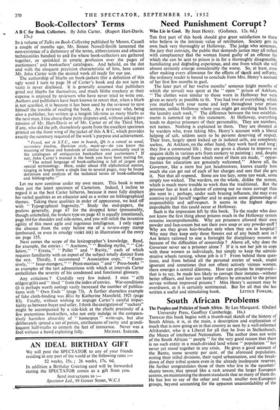Need Punishment Corrupt ?
Who Lie in Gaol. By Joan Henry. (Gollancz. 12s. 6d.)
THE first part of this book should give great satisfaction to those who believe in the intrinsic value of retribution. Society gets its own back very thoroughly at Holloway. The judge who sentences, the jury that convicts, the public that demands justice may all reflect with complacency that the woman found guilty of an offence for which she can be sent to prison is in for a thoroughly disagreeable, humiliating and deleading experience,-and one from which she will almost certainly emerge considerably the worse. So, at least, even after making every allowance for the effects of shock and self-pity, the ordinary reader is bound to conclude from Mrs. Henry's account of her first few months in gaol.
The later part of her twelve months' sentence (eight months of which she served) was spent at the " open " prison of Askham. " The clothes were similar to those worn in Holloway but were given as nearly as possible to fit. You had two of everything, which you marked with your name and kept throughout your prison sentence, unlike Holloway where you might get anything back from the laundry each week." The difference between the two establish. ments is summed up in this statement. At Holloway, everything tends to deprive prisoners of their personality. They are numbers, not names. Nothing is explained to them. They are shouted at by warders who, even taking Mrs. Henry's account with a liberal helping of salt, seldom seem to be persons deserving of respect. Their lives, largely spent locked up in isolated cells, are completely useless. At Askham, on the other hand, they work hard and long ; they live a communal life ; they are given a chance to improve or acquire skills in various arts from cookery to painting ; and, despite the unpromising stuff from which most of them are made, " oppor- tunities for education are genuinely welcomed." Above all, the Governor, like a stern but just headmistress, knows exactly how much she can get out of each of her charges and sees that she gets it. Not that all respond. Some are too lazy, some too weak, some simply too wicked. The, warders, on the whole, dislike the system, which is much more trouble to work than the traditional. But the prisoner has at least a chance of coming out no more corrupt than she went in ; perhaps, under such bracing influence, she may even contrive to pull herself together and to acquire some glimmerings of responsibility and self-respect. It seems in the highest degree improbable that this could occur at Holloway.
Such is the impression left by this book. To the reader who does not know the first thing about prisons much in the Holloway system remains incomprehensible. Why are prisoners allowed their own powder and face-cream but not their own soap or any powder-puff ? Why are they given hair-brushes only when they are in hospital ? Why may they keep only three flowers out of any bunch sent in ? Are letters rationed to one a fortnight for disciplinary reasons or because of the difficulties of censorship ? Above all, why does the Governor never see a prisoner alone ? If it is not her job to cope with these women as individuals, but simply to keep the admini- strative wheels turning, whose job is it ? From behind these ques- tions, and from behind all the personal stories of weak, stupid ignorant and sometimes (but not often) actively vicious women, there emerges a central dilemma. How can prisons be improved— that is to say, be made less likely to corrupt their inmates—without better officers, and how can better officers be attracted "tothe prison service without improved prisons ? Miss Henry's account may be overdrawn, as it is certainly sentimental. But for all that she has written a useful and stimulating book. LETTICE FOWLER.


































 Previous page
Previous page